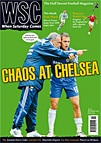 A-League clubs are allowed one star signing and Juninho has joined Sydney FC. But, asks Mike Ticher, does the Brazilian have what it takes to match the achievements of his predecessor, Dwight Yorke?
A-League clubs are allowed one star signing and Juninho has joined Sydney FC. But, asks Mike Ticher, does the Brazilian have what it takes to match the achievements of his predecessor, Dwight Yorke?
In 1975 the Australian leg-spinner Kerry O’Keeffe arrived in Blackburn for a season as the professional for East Lancs in the Lancashire League. All he heard on his first night there was how brilliant he would have to be to emulate a long list of predecessors – each one ticked off with a resounding: “He were a good ’un.”
Juninho may not have developed a passion for cricket during his time in England, but he can certainly appreciate the pressure of being “the pro” now. Signed as Sydney FC’s “marquee” player for 2007-08 – meaning he can be paid outside the club’s salary cap – he missed three of the first five games with a shoulder injury as the team struggled to escape the mid-table morass of a stodgy league. (The champions Melbourne somehow managed to be third after drawing their first five matches.
In a truncated second appearance, against Adelaide United, Juninho seemed palpably unfit, unable to do the running off the ball that used to put him into goalscoring areas, yet he still managed to hit the bar twice and set up what should have been the winning goal with a characteristically deft pass.
The lot of the marquee player can be a tough one, even if the weight of expectation in Sydney is not quite of Beckhamesque proportions. Juninho ticked the first two essential boxes by making the appropriate noises about his team-mates (“Steve Corica is a great player”) and his adopted city (“similar to the way we live in Brazil”). Although if he was thinking of his home town, Sydneysiders might not take that as a compliment, generally preferring to imagine their city as a glamorous Rio to Melbourne’s humdrum São Paulo.
But anodyne niceties only get you so far. The marquee player also has to sparkle on the field and, if he wants to be remembered as a good ’un, must lift the team at least to within touching distance of a trophy. Juninho’s predecessor, Dwight Yorke, managed both, to the surprise of some, by taking his football as seriously as his clubbing, and led the club to the first A-League title.
Even that may not be enough if the imported star fails to engineer his departure with good grace. Yorke’s prevarication at the start of last season, followed by his eventual embrace of Sunderland, left a bad taste in Sydney and meant that it was too late to sign anyone else.
Juninho was not Sydney’s first choice of this season – they tantalised fans for weeks with the prospect of Phillip Cocu or Robbie Fowler – but his arrival fits a shift in the A‑League’s focus from Europe to South America. Brazilians are this season’s must-have accessory (along with the odd Argentine and Costa Rican), mostly journeymen hoping to raise their profile and engineer a bigger move. Adelaide’s left-sided player Cassio looks the most likely to follow the model of Fred, whose outstanding season at Melbourne last year won him a lucrative deal with DC United. Of the new arrivals, only Mario Jardel at Newcastle falls into the faded glory category.
That change of emphasis can only benefit the league, since a mid-career Brazilian journeyman generally has more to offer than an ageing British one, as Brian Deane graphically demonstrated in his brief spell at Perth. Off the field, too, Australia has shifted its gaze. With the early departure of Deane’s svengali, Steve McMahon, and Terry Butcher’s rancorous flight from Sydney to a passionate hotbed of football more suited to his temperament (Brentford), the era of the traditional British coach seems finally to be drawing to a close. Instead, Australian coaching is now dominated by Dutchmen (the national director Rob Baan and the new national coach Dick Advocaat), local ex-players with continental rather than British experience, and Scots (Ernie Merrick at Melbourne and Lawrie McKinna at Central Coast) who have been here for decades and who take coaching qualifications and technique seriously.
All are happier to plug into the network of globe-trotting South Americans than pay over the odds for worn-out British pros. For the players, Australia has become a plausible stop on the merry-go-round of second-tier leagues: financially not as rewarding as MLS, perhaps, but more credible than Malaysia, more visible than Qatar and more relaxed than Japan.
As a result, a respected Brazilian veteran now makes the ideal mentor. If Juninho can just fix his shoulder, get fit, inspire better performances from his Bambi-like compatriot Patrick, score from long range every so often, learn to surf, improve his swearing, lead Sydney to a crushing grand final triumph and host the team barbecue afterwards, he might get the ultimate pro’s accolade. Not that the next bloke who comes along will thank him for it.
From WSC 249 November 2007